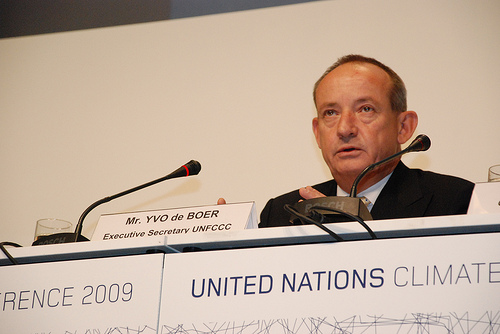Dearest Readers,
I write to you from Copenhagen, where I have come to witness the big climate conference. O the life of a Grist columnist gets more glamorous by the day! Be sure to check out our coverage, and follow my adventures on Twitter. Yes, dear readers, I’ve finally succumbed to the tweet hereafter — but rest assured, I’ll still hole up in the stacks at good old Grist headquarters tracking down the answers to your burning questions. For now, I’m holed up in a Danish hotel room, climate skeptics banging on the door. Odds bodkins, they are persistent.
Q. Dear Umbra,
Years ago I decided to forever boycott Christmas and all the mass consumerism that goes along with it. Initially this entailed simply not buying gifts at all, and looking like a regular Scrooge. Last year it entailed taking all of my holiday gift money and making donations with it. I want to do something similar this year, but wanted to ask you first: What are the best organizations I can donate to, to make my green dollars go their very farthest this holiday season? My goal is to make donations to organizations that make the best use of donations, for green political activism, forest restoration, environmental justice, etc. Your advice is greatly appreciated!
A. Spencer
Chapel Hill, N.C.
A. Dearest A.,
 Give a little to Grist, get a lot in return — click the photo for details on this shameless plug.I fully acknowledge that this answer is a bit self-serving, but here goes: give to Grist! We are raising funds right now to help us continue to do our good nonprofit work in 2010, including this column. If you donate, you will be richly rewarded with perks like a fetching T-shirt and monthly online chats with Grist writers including me. What a deal!
Give a little to Grist, get a lot in return — click the photo for details on this shameless plug.I fully acknowledge that this answer is a bit self-serving, but here goes: give to Grist! We are raising funds right now to help us continue to do our good nonprofit work in 2010, including this column. If you donate, you will be richly rewarded with perks like a fetching T-shirt and monthly online chats with Grist writers including me. What a deal!
Should you still have money left after making your donation to Grist, I have a few ideas for you. While I admire your plan, I’m not going to rattle off the names of any specific organizations, so as to maintain my serene objectivity. However, I can suggest some resources: Charity Navigator will help you find out about larger green groups, and the Orion Grassroots Network is a useful guide to more modest ones. If you want to support a specific project instead, here are a few places to look: Global Giving, Kiva, and ioby. The last one, which stands for “in our back yards,” is New York-based at the moment, but hopes to expand; as we wrote earlier this year, it’s an interesting example of how to get green done on a local, micro level.
Allow me to also point you to my previous column on holiday donations, which has more thoughts from me and a wassail cup full of specific, impassioned ideas from your fellow readers. See what they suggest.
May your anti-consumerist Christmas be filled with joy.
Merrily,
Umbra
Q. Dear Umbra,
Whenever my mother tells people that her daughter is applying to graduate school for journalism, all she gets are condolences. She has decided that she wants to give magazine subscriptions this holiday season to support the print industry. As a journalist, I’m always torn between the wasted paper inherent in print media, and my love for it (and future dependence on it — at least until electronic media catches on). I’ve searched high and low for a list of sustainably printed magazines, but can’t seem to find any. Help before my mother starts sending glossy pages all over the country!
Rose E.
San Diego, Calif.
A. Dearest Rose,
 A dying read?Journalism may be changing dramatically, but it is not going anywhere. You have chosen an interesting, dynamic profession, and your mother should feel confident in telling sympathizers just that.
A dying read?Journalism may be changing dramatically, but it is not going anywhere. You have chosen an interesting, dynamic profession, and your mother should feel confident in telling sympathizers just that.
It’s true that traditional media outlets are suffering, but there’s some tiny good news: while 367 magazines shut down this year, 247 new ones launched. So you see, the magazine as a concept is not dead. Also, I think it’s safe to say electronic media has indeed “caught on,” and sometimes it even involves steady work. Viz.: Yours truly.
But enough of my blather. You asked for a list of magazines printed sustainably, and voila! A list of magazines printed sustainably. It’s sortable by category, so if your mother wants to buy a crafts magazine for one friend and a spirituality title for another, she’s in luck. And it actually goes into an impressive level of detail about how much recycled content the magazines use, where the paper comes from, and, in some cases, the company’s other green efforts.
I hope this helps, Rose. And I hope you thrive in J-school.
Encouragingly,
Umbra
Q. Dear Umbra,
I do not know how to dispose of unused or outdated medications. Where, what, and how? Thank you in advance.
Florence S.
Bath, Me.
A. Dearest Florence,
You are not alone. Here are some quick tips:
1. Do not flush or pour any medication down the drain. Flushed medication ends up in our waterways, not only harming fish and other critters but often finding its way back into our drinking water. Yuck. There are a very few exceptions to this rule, which you can find on this FDA list. But in general: please don’t flush.
2. Call your pharmacy. These days, many pharmacies have drug take-back programs or will be able to refer you to one.
3. Call your local hazardous-waste facility. Drugs are considered hazardous waste, and your town may well have an easy way for you to dispose of them.
4. If all else fails, throw them away — carefully. The goal is to get your drugs to the landfill without making them appealing in some way to pets, children, or people who rifle through trash looking for drugs. Experts suggest taking the drugs out of their original container, mixing them with something unappealing like cat litter or used coffee grounds, then putting the whole caboodle in a sealed bag or other closed container. Remember to take off or black out the personal information and Rx number on your original container before you toss it (you might be able to recycle it — see the next letter).
All this work should fool your neighborhood squirrels. But remember that the trash is your third-best option. With hope, your pharmacy or hazardous waste people will help your drugs meet a healthier end.
Don’t flushily,
Umbra
Q. Dear Umbra,
I can understand that a recycling station might accept only plastics type 1 and 2. What I can’t understand is the common situation that they’ll accept only types 1 and 2, and only if the plastic is in the shape of a narrow-necked bottle. If it’s made of the same stuff, and in the recycling process will be ground up and melted down (or so I assume), why does the shape of the plastic item matter? Thanks!
Jonathan T.
Norwich, Vt.
Send your question to Umbra!
A. Dearest Jonathan,
Recycling rules do often seem arbitrary, don’t they? We’ll take mayonnaise jars, but only if there’s a dab of mustard on the lid and a pickle on the side … it can be mind-boggling at times. In this case, however, there actually is a logical reason.
That reason being that narrow-necked bottles (such as soda, shampoo, and dish soap often come in) are manufactured differently than wide-necked items like yogurt containers. The narrow-necked ones are blow-molded, while the others are injection-molded. Even if the types of plastic are the same, the rigamarole they go through during manufacture leaves them with different melting points, which means they must be handled differently in the recycling process. So it is sometimes difficult to find a buyer who wants or can handle both. For a much more detailed look at this topic, and a refresher on why you’re glad you don’t oversee a recycling program, see this plastics explainer from the good folks at the Central Virginia Waste Management Authority.
Plastic recycling continues to be a confusing topic for many readers. My best advice is to first buy as little plastic as possible, then do what Jonathan here has done: pay close attention to your town’s recycling guidelines and recycle what you can. Should you have time for a little light reading, I also recommend the eye-opening Plastic Recycling Facts at Earth911, and the Ecology Center’s Seven Misconceptions About Plastic Recycling. You might never look at a tub of butter the same way again.
Meltily,
Umbra



